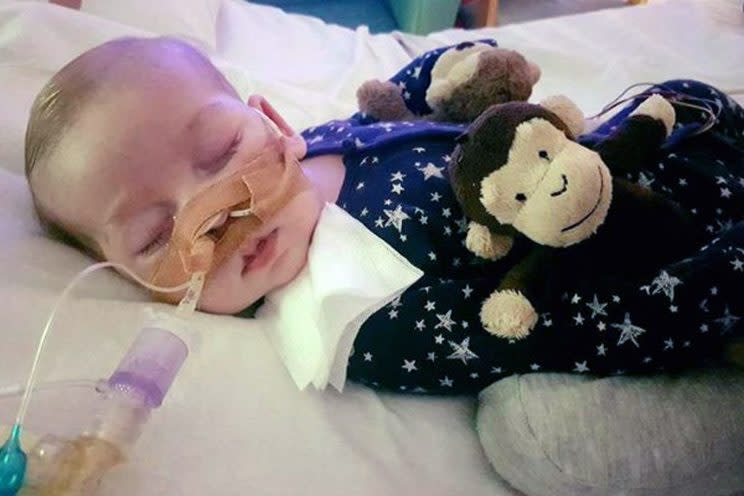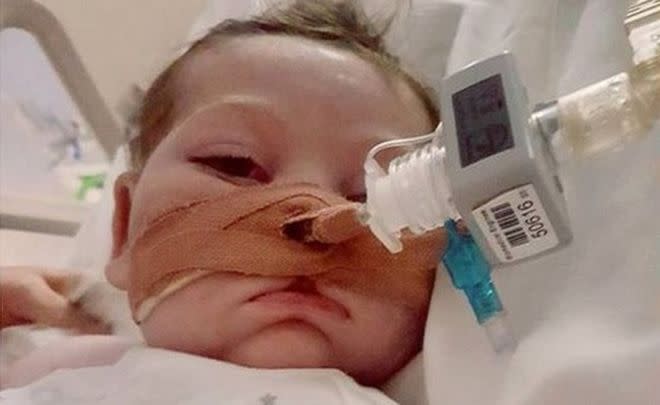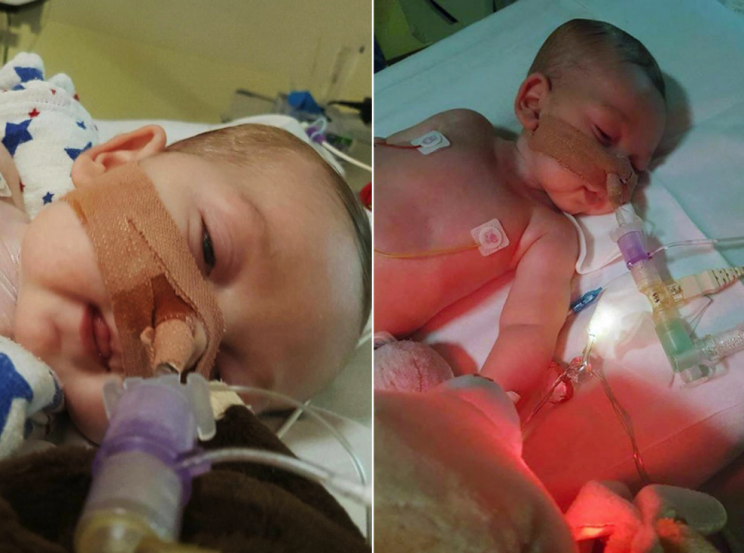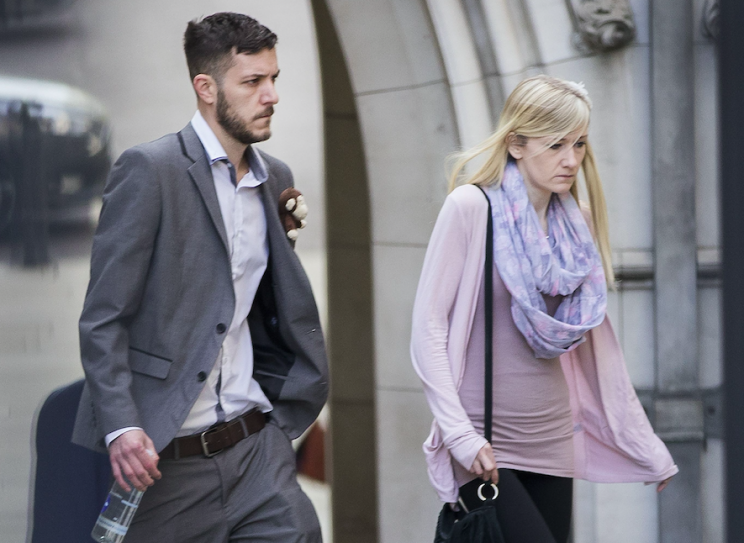Charlie Gard: Terminally ill baby to have life support turned off today after parents claim they were 'refused to take him home to die'

Terminally ill baby Charlie Gard is to have his life support turned off today, his parents have said, as they accused “heartless” doctors of refusing to let them take him to die in his own home.
Chris Gard and Connie Yates wanted Charlie, who suffers from a rare genetic condition and has brain damage, to undergo a therapy trial in the US.
But the couple had their plea for help rejected by European Court of Human Rights judges in Strasbourg after exhausting all avenues in England.
Read more: Charlie Gard’s parents lose appeal
The couple have now claimed that their “final wish” to tale Charlie home to die has been refused.
Ms Yates told the Daily Mail: ‘We’ve been talking about what palliative care meant. One option was to let Charlie go home to die. We chose to take Charlie home to die. That is our last wish. We promised our little boy every single day that we would take him home.”
Mr Yates: “Our parental rights have been stripped away. We can’t even take our own son home to die. We’ve been denied that. Our final wish if it all went against us can we take our little boy home to die and we are not allowed.
“They even said no to a hospice.”

Court of Appeal judges ruled doctors could stop providing life-support treatment to Charlie
A spokesperson for Great Ormond Street Hospital said: ‘As with all of our patients, we are not able to and nor will we discuss these specific details of care. This is a very distressing situation for Charlie’s parents and all the staff involved and our focus remains with them.’
Last week, the hospital said the European Court decision marked “the end” of a “difficult process”. It said there would be “no rush” to change Charlie’s care and that there would be “careful planning and discussion”.
Charlie was born a “perfectly healthy” baby at full term and at a “healthy weight” on 4 August.
However, in September Charlie’s parents notice that he is less able to lift his head and support himself than other babies of a similar age.
Read more: Explainer – the mitochondrial disease Charlie suffers from
Doctors discoveed that he had a rare inherited disease – infantile onset encephalomyopathy mitochondrial DNA depletion syndrome (MDDS).

A High Court judge had, in April, ruled against a trip to America and in favour of Great Ormond Street doctors.
Mr Justice Francis concluded that life support treatment should end and said Charlie should be allowed to die with dignity.
A fund-raising campaign for Carlie to pay for his visit to the US has raised more than £1.4 million.
Three Court of Appeal judges and Supreme Court justices had upheld that ruling after hearings in London.

Mr Justice Francis had made a ruling on April 11 after a trial in the Family Division of the High Court in London.
He heard that Charlie, who was born on August 4, had a form of mitochondrial disease, a condition that causes progressive muscle weakness and brain damage.
The judge was told that Charlie could only breathe through a ventilator and was fed through a tube.
Mr Justice Francis said he had made his decision with the ”heaviest of hearts” but with ”complete conviction” for Charlie’s best interests that he should be allowed to die peacefully and with dignity.
The judge said experts in Spain had also considered Charlie’s case and reached the same conclusion.
Specialists in the USA had offered an experimental therapy called nucleoside.
Mr Justice Francis said Charlie’s parents had, understandably, grasped at the possibility that the therapy might be ”pioneering treatment”.
But he added: ”There is unanimity among the experts from whom I have heard that nucleoside therapy cannot reverse structural brain damage.
”I dare say that medical science may benefit, objectively, from the experiment, but experimentation cannot be in Charlie’s best interests unless there is a prospect of benefit for him.”
Richard Gordon QC, who led Charlie’s parents’ legal team, had told Court of Appeal judges that the case raised ”very serious legal issues”.
”They wish to exhaust all possible options,” Mr Gordon said in a written outline of Charlie’s parents’ case.

”They don’t want to look back and think ‘what if?’.
”This court should not stand in the way of their only remaining hope.”
Mr Gordon suggested that Charlie might be being unlawfully detained and denied his right to liberty.
He said judges should not interfere with parents’ exercise of parental rights.
Lawyers, who represented Charlie’s parents for free, said Mr Justice Francis had not given enough weight to Charlie’s human right to life.
They said there was no risk the proposed therapy in the US would cause Charlie ”significant harm”.
Katie Gollop QC, who led Great Ormond Street’s legal team said it would be “inhuman to permit that condition to continue.”
Ms Gollop said nobody knew whether Charlie was in pain.
”Nobody knows because it is so very difficult because of the ravages of Charlie’s condition,” she said. ”He cannot see, he cannot hear, he cannot make a noise, he cannot move.”
Appeal judges Lord Justice McFarlane, Lady Justice King and Lord Justice Sales had paid tribute to the couple.
But they said Mr Justice Francis had been entitled to reach the conclusions he reached.
Timeline of Charlie’s life:
:: August 4 2016 – Charlie Gard is born a “perfectly healthy” baby at full term and at a “healthy weight”.
:: September 2016 – Charlie’s parents notice that he is less able to lift his head and support himself than other babies of a similar age. Doctors discover that he has a rare inherited disease – infantile onset encephalomyopathy mitochondrial DNA depletion syndrome (MDDS).
:: October 2016 – Charlie has become lethargic and his breathing is shallow and he is transferred to the Great Ormond Street Hospital for Children in London on October 11.
:: December 2016 – Charlie spends his first Christmas in hospital with his parents putting a festive bib on the youngster and sharing a picture captioned “our little elf”.
:: January 2017 – A crowdfunding page is set up to help finance trial therapy in the United States.
:: March 3 2017 – Great Ormond Street bosses ask Mr Justice Francis to rule that life support treatment should stop.
:: April 11 – Mr Justice Francis says doctors can stop providing life-support treatment after analysing the case at a hearing in the Family Division of the High Court in London.
:: May 3 – Charlie’s parents ask Court of Appeal judges to consider the case.
:: May 23 – Three Court of Appeal judges analyse the case and dismiss the couple’s appeal two days later.
:: June 8 – Charlie’s parents lose fight in the Supreme Court – his mother screams as justices announce their decision.
:: June 20 – Judges in the European Court of Human Rights start to analyse the case after lawyers representing Charlie’s parents make written submissions.
:: June 27 – European court judges refuse to intervene. A Great Ormond Street spokeswoman says the European Court decision marks “the end” of a “difficult process”. She says there will be “no rush” to change Charlie’s care and says there will be “careful planning and discussion”.
:: June 29 – Charlie’s parents say his life-support will be switched off on Friday June 30.

 Yahoo News
Yahoo News 
